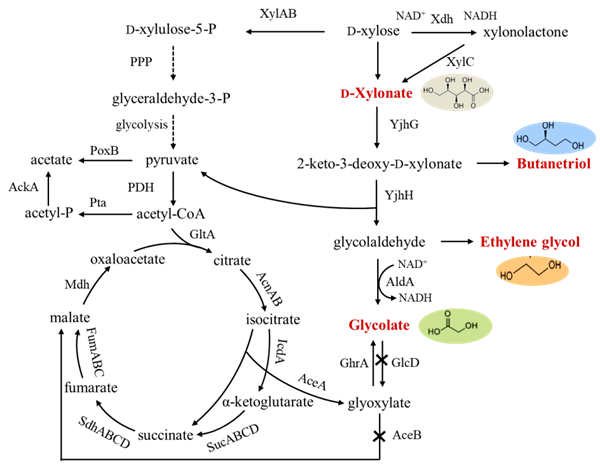
Lignocellulosic biomass, which refers to dry matter of the plant, is the most abundant and low-cost renewable resource on the planet. Xylose is the second most abundant sugar in nature, accounting for 18–30% of sugar in lignocellulose. Hence, efficiently metabolizing xylose could optimize the economics of lignocellulose-based bio-refinery processes. In fact, only a small fraction of microorganisms have the native metabolic pathway of xylose.
Recently, a research team led by Prof. ZHAO Guang from Qingdao Institute of Bioenergy and Bioprocess Technology (QIBEBT) of the Chinese Academy of Sciences achieved the high-value chemicals of glycolate and ethylene glycol from xylose in Escherichia coli. Their findings were published in Microbial Cell Factories.
Escherichia coli is a good choice as a host for xylose utilization due to its low cultivation cost, high growth rate, simple genetic manipulation and the native xylose metabolic pathway. However, the native xylose metabolic pathway of E. coli is very long and consumes much energy, which may affect the conversion efficiency.
A new metabolic pathway of xylose in Caulobacter crescentus may compensate for these problems. Therefore, researchers constructed new synthetic pathways for glycolate and ethylene glycol in E. coli by introducing this new metabolic pathway of C. crescentus.
In the fed-batch cultivation, they found that the engineered strain produced 43.60 g/L glycolate, with 0.91 g/L/h productivity and 0.46 xylose yield. The titer of ethylene glycol was 72 g/L with 1.38 g/L/h productivity and 0.40 xylose yield. The titer and productivity were more than twice higher compared with the current level, and the yield was close to the theoretical value.
These findings will enrich the range of products from xylose, increase the xylose conversion efficiency, and lay foundation for the industrial application of bio-refinery of xylose.
This study was supported by the National Natural Science Foundation of China, the Chinese Academy of Sciences and the China Postdoctoral Science Foundation.

The metabolic pathways of xylose for conversion of high-value chemicals. (Image by LIU Min)

86-10-68597521 (day)
86-10-68597289 (night)

52 Sanlihe Rd., Xicheng District,
Beijing, China (100864)

